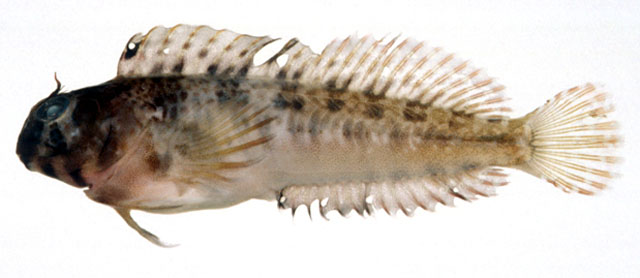| Blenniidae (Combtooth blennies), subfamily: Salariinae |
| 9 cm TL (male/unsexed) |
|
demersal; marine, oceanodromous |
| Northwest Pacific: southern Japan and Korea. |
|
Dorsal spines (total): 12-12; Dorsal soft rays (total): 16-18; Anal spines: 2-2; Anal soft rays: 17-18. Gill opening wide, membranes broadly united and free from isthmus. Jaws with immovable teeth and a pair of canines posteriorly. Supraorbital cirrus present, longer in male. Body color extremely variable. |
| Adults are common in rocky shore areas. They feed on algae and detritus (Ref. 9137). Attain less than 9 cm TL. Oviparous. Eggs are demersal and adhesive (Ref. 205), and are attached to the substrate via a filamentous, adhesive pad or pedestal (Ref. 94114). Larvae are planktonic, often found in shallow, coastal waters (Ref. 94114). |
|
Least Concern (LC); Date assessed: 04 February 2009 Ref. (130435)
|
| harmless |
Source and more info: www.fishbase.org. For personal, classroom, and other internal use only. Not for publication.

